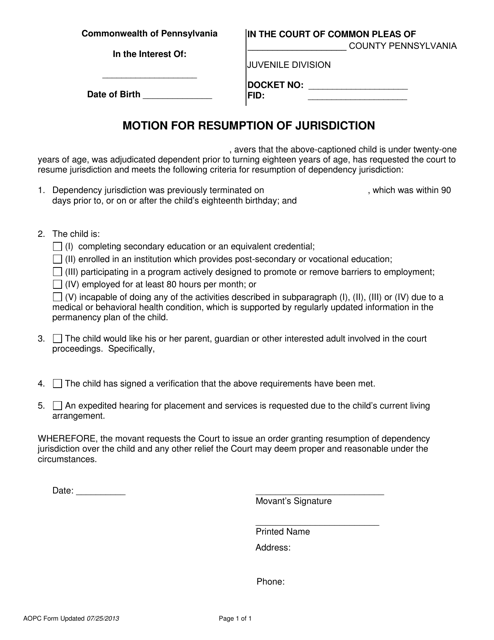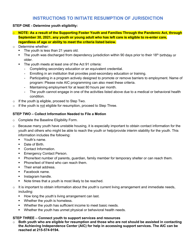Motion for Resumption of Jurisdiction - Pennsylvania
Motion for Resumption of Jurisdiction is a legal document that was released by the Pennsylvania Court of Common Pleas - a government authority operating within Pennsylvania.
FAQ
Q: What is a Motion for Resumption of Jurisdiction?
A: A Motion for Resumption of Jurisdiction is a legal motion filed in Pennsylvania to request the court to resume jurisdiction over a particular case.
Q: When can a Motion for Resumption of Jurisdiction be filed?
A: A Motion for Resumption of Jurisdiction can be filed when a case has been previously transferred to another court or jurisdiction, and now the party wants the case to be brought back under the jurisdiction of the Pennsylvania court.
Q: What is the purpose of filing a Motion for Resumption of Jurisdiction?
A: The purpose of filing a Motion for Resumption of Jurisdiction is to bring a case back under the jurisdiction of the Pennsylvania court, so that the court can continue to hear and decide on the issues in the case.
Q: Who can file a Motion for Resumption of Jurisdiction?
A: Any party to the case, or their legal representative, can file a Motion for Resumption of Jurisdiction.
Q: What is the process for filing a Motion for Resumption of Jurisdiction?
A: The process for filing a Motion for Resumption of Jurisdiction involves preparing and filing the motion with the Pennsylvania court, and then serving the motion on the other parties involved in the case.
Q: Are there any specific requirements or deadlines for filing a Motion for Resumption of Jurisdiction?
A: Yes, there may be specific requirements or deadlines for filing a Motion for Resumption of Jurisdiction, which can vary depending on the rules and procedures of the Pennsylvania court.
Q: What happens after a Motion for Resumption of Jurisdiction is filed?
A: After a Motion for Resumption of Jurisdiction is filed, the court will review the motion and consider the arguments and facts presented. The court will then make a decision on whether to grant or deny the motion.
Q: Can a Motion for Resumption of Jurisdiction be contested?
A: Yes, the other parties involved in the case have the opportunity to contest or oppose the Motion for Resumption of Jurisdiction by filing their own legal arguments or objections.
Q: What are the potential outcomes of a Motion for Resumption of Jurisdiction?
A: The potential outcomes of a Motion for Resumption of Jurisdiction include the court granting the motion and resuming jurisdiction over the case, or denying the motion and allowing the case to remain under the jurisdiction of the current court or jurisdiction.
Q: Is legal representation necessary when filing a Motion for Resumption of Jurisdiction?
A: While it is not mandatory to have legal representation when filing a Motion for Resumption of Jurisdiction, it is advisable to seek the assistance of an attorney who is familiar with the legal process in Pennsylvania to ensure that the motion is properly prepared and filed.
Form Details:
- Released on July 25, 2013;
- The latest edition currently provided by the Pennsylvania Court of Common Pleas;
- Ready to use and print;
- Easy to customize;
- Compatible with most PDF-viewing applications;
- Fill out the form in our online filing application.
Download a fillable version of the form by clicking the link below or browse more documents and templates provided by the Pennsylvania Court of Common Pleas.


